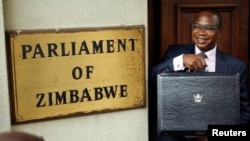Zimbabwe’s Finance Minister Mthuli Ncube says the country is expected to record an economic recovery of up to 3% in 2020 against a projected negative growth of -6.5% this year.
Presenting his proposed $63.6 billion national budget in parliament today, Ncube said the projected economic recovery is premised on expectations that Zimbabwe would record a better rainfall season supported by increased support towards rehabilitation and development of irrigation infrastructure to sustain agricultural projects and other issues.
He said the country is expected to record improved macroeconomic stability through continued fiscal and monetary discipline, as well as a substantial improvement in the balance of payments.
Other economic push factors, according to Ncube, include “improved electricity supply through imports and other alternative sources of energy. These include harnessing of emergency power generation capacity from independent power projects; extension of supportive tax and non-tax incentives to stimulate domestic production; advancing implementation of the ongoing ease of doing business reforms to improve the investment environment; and increased investments by both government and the private sector.”
SINGLE DIGIT INFLATION
Similarly, he said, monthly inflation is expected to fall to single digit from the first quarter of 2020 to close the year around 2%.
The finance minister noted that the 2020 national budget marks the exit from austerity to “growth stimulation and employment generation era through promotion of production oriented investment and productivity, without losing focus on fiscal responsibility.
“The 2020 Budget prioritises … productivity and growth, jobs creation, competitiveness, promotion of more sustainable and inclusive development and export diversification and import substitution. The growth and productivity thrust will be supported by the reengagement process with the international community which will enable us to meet our budget objectives.”
ESTIMATED REVENUES/EXPENDITURES
Ncube said revenue collections for 2020 are estimated at ZWL$58.6 billion. “In order to avoid the undesirable impact of deficits on money supply and macroeconomic stability, the 2020 Macro Fiscal Framework espouses a low budget deficit of around 1.5% of GDP (Gross Domestic Product) implying expenditures of ZWL$63.6 billion, excluding retentions.”
He said the main fiscal policy objective in 2020 is directed at managing expenditure within the allocated framework supported by noninflationary financing and complemented by a tight monetary policy.
“… Strict adherence to the procedures laid out in the Public Finance Management Act [Chapter 22:19], including the issuance of warrants by the Accountant General prior to any spending commitment made by an accounting officer will also be strictly enforced. Rule of law will be the order of the day under my watch.”
FUEL AND ELECTRICITY PROBLEMS
The finance minister stressed that government will strive to address the current fuel shortages and electricity outages affecting millions of people and large numbers of industries in Zimbabwe.
“Government has already instituted new pricing frameworks for fuel and electricity that adequately reflect costs, including those resulting from changes in import prices and exchange rate fluctuations. The pricing framework for fuel also ensures that pump prices remain comparable to those charged in neighbouring countries, so as to remove arbitrage opportunities arising from illicit fuel exports.”
He said ZWL$8.4 billion will be used for power generation.
“… The 2020 Budget seeks to alleviate power supply constraints through the rehabilitation and expansion of Hwange Thermal Power Station, supporting alternative sources of energy such as solar power projects through various fiscal incentives relating to importation of equipment and respective accessories. IPP solar projects are already lined up for implementation. While ZESA (Zimbabwe Electricity Supply Authority) will raise the local resource component through cost recovery tariff model, Government through the RBZ (Reserve Bank of Zimbabwe) will assist to mobilise the requisite foreign currency from the market.”
CORRUPTION
Ncube further said the Zimbabwean government will fight tooth and nail to eradicate corruption.
“Corruption causes economic malaise, wastage of public resources, jeopardises the environment for domestic and foreign investment and general morale in the public service, reinforces political instability and propagates social and economic disparities even in the presence of economic and social policies. Based on the Auditor General’s Report, Government is losing resources through corrupt activities. In addition, corruption in some parastatals and Local Authorities has compromised some desired development outcomes.
“There is a risk that some Development Partners may withhold funding for critical programmes and/or projects. Delays in taking remedial action against violations identified in audit reports has the unintended effects of propagating corrupt tendencies in the public service.”
He said to avert this risk, government from 2020 will focus on strengthening the internal control systems through among others, “finalisation of the establishment of the Centralised Internal Audit Unit; Developing and implementing a national anti-corruption strategy aligned with good practice principles with periodic monitoring and evaluation results; Enacting whistle blower legislation and protection in line with international best practices and capacitating institutions established to combat corruption,”
Ncube said the government would also tackle corruption through addressing conflict of interest issues where government is both regulator and player. “Furthermore, observations by the Auditor General will be pursued with a view of taking corrective measures.”




